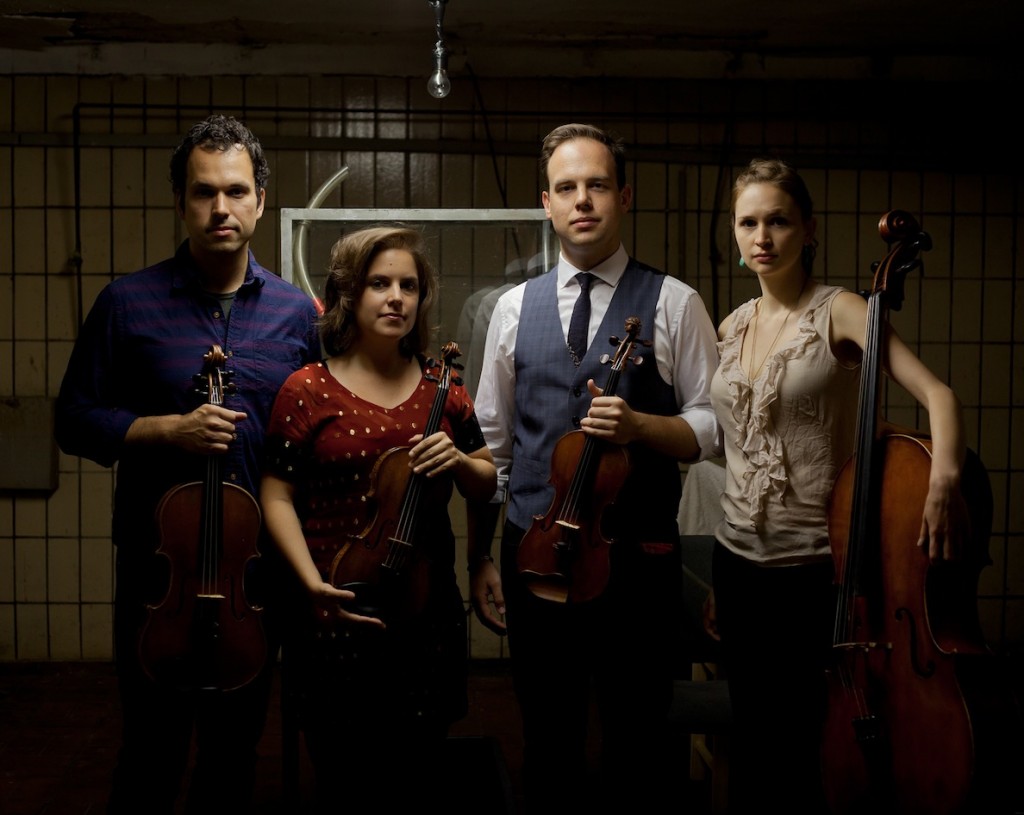A compelling concert by a young quartet playing younger music
In recent years, new music concerts have taken on a particular characteristic of rock shows, with ensembles and composers playing the same works that appear on newly released recordings. Outside of the merits of the music, there is often the disappointing sensation of hearing something slightly canned.
So the Mivos Quartet’s approach for their Thursday night concert at the DiMenna center celebrating their excellent debut CD, Reappearances, was refreshing and welcome: they played four pieces, only one of which is on the new recording. Beyond that, two of the compositions were U.S. premieres, and one a world premiere. The evening was less a debut than a validation for the status and stature of an impressive and increasingly important group.
Each musician — violinists Olivia de Prato and Joshua Modney, violist and spokesman Victor Lowrie and cellist Mariel Roberts — is skilled and focused, and they share a physically, intellectually and aesthetically energetic engagement with the high Modernist values of harmonic, gestural and structural complexity.
The quartet is both young and experienced. Their credits include an appearance at the Wien Modern Festival this year, the Fellowship Prize for Interpretation at the 2012 Darmstadt Internationalen Ferienkurse, and important credits on the debut release from the progressive rock band The Knells.
The only concession to their age is that the group sounds like it is still seeking the ideal blend of timbre and color. They have a big and vigorous sound and play soft and loud with a full tone. The shade of Bartók’s string quartets hovers distantly but distinctly in their playing, as it did for all the pieces on the program.
The most familiar piece — from Reappearances — was Corde Vocale, Felipe Lara’s impassioned exercise for four dramatically quarrelsome voices. The music from each instrument gesticulates grandly, and each attempts to upstage the others before half-turning to snip and snarl as the group drags it back into the fold — a stirring way to end the disc and the concert.
Opening the evening was music with a roughly similar sound, Dai Fujikara’s String Quartet No. 2, subtitled “flare.” The composer uses the metaphor of sparks, burning embers and smoke, snapping, leaping and curling off a fire. His language is a useful way to describe how the piece starts, each musician with a discrete part, the music on each stave flying away from the others.
Fujikara’s writing also wields copious aggressive techniques, like col legno, spiccato, jetée, finger taps and more. There are clear repeated phrases, even amid the noise, and then the concentration of mood and technique gives way to an inventive, tough-sounding music. The lines for each instrument cohere into pitch and phrase, the voices gradually move from independence to coordinated rhythms and phrases. Each plays diatonically in its own key, creating a dense, dissonant polyphony.
Next came Mark Barden’s problematic Nocturne, like the previous work a U.S. premiere. Barden’s notes about his music are written in impenetrable graduate-school-speak and ultimately serve to give the impression there is more there than meets the ear. But there isn’t.
There are fussy elements like quarter-tone tuning and a cello prepared with a couple metal clips, all amounting to little. The three movements have a monomaniacal focus on alternating soft and loud chords, and despite the tempo indications there no feeling of a pulse.
Barden has some fine material to work with in the middle movement, marked “Slow, hypnotic,” with complex, wispy tones coming off the cello. But he does nothing with them except beat them down with more loud chords. The relentlessly dry timbre of the writing grows tiresome and abrasive long before the end.
Scott Wollschleger’s String Quartet No. 2, “White Wall,” was a world premiere. The composer uses the fundamentally identical juxtaposition of soft and loud, but with imagination, thought and feeling. Where Barden’s music is hostile, Wollschleger’s is intimate and sympathetic.
His String Quartet No. 2 is a wonderful composition. Written in two parts with a barely discernible separation, the piece is so intensely quiet that it demands the listener’s full concentration. For a long time there is no pitched music, just shimmering whispers from the strings, rising and falling like the breath of sleepers in the dark.
This goes on for a time and is mesmerizing. Gradually, pitches appear and disappear briefly, with a bow stroke or a sharp pluck, like particles bubbling into reality out of the quantum haze of interstellar space. These notes never come together in standard configurations. Instead, energy flows around and through the music, finding moments of articulateness, then falling back into fascinating, diffident ratiocination. “White Wall” is an exemplary contemporary composition played by the Mivos Quartet, an exemplary contemporary ensemble.
The Mivos Quartet appears with Saul Williams at the Ecstatic Music Festival, 7:30 p.m. February 26 at the Kaufmann Center. kaufmannmusiccenter.org








Posted Dec 26, 2013 at 1:41 am by Corry Shores
Thanks very much George Grella. This is an excellent review. I especially appreciate your descriptions of the music. I have heard some of Wollschleger’s work before, but the way you describe it makes me want to go back and listen again, now that you have given me a way to appreciate it even more.